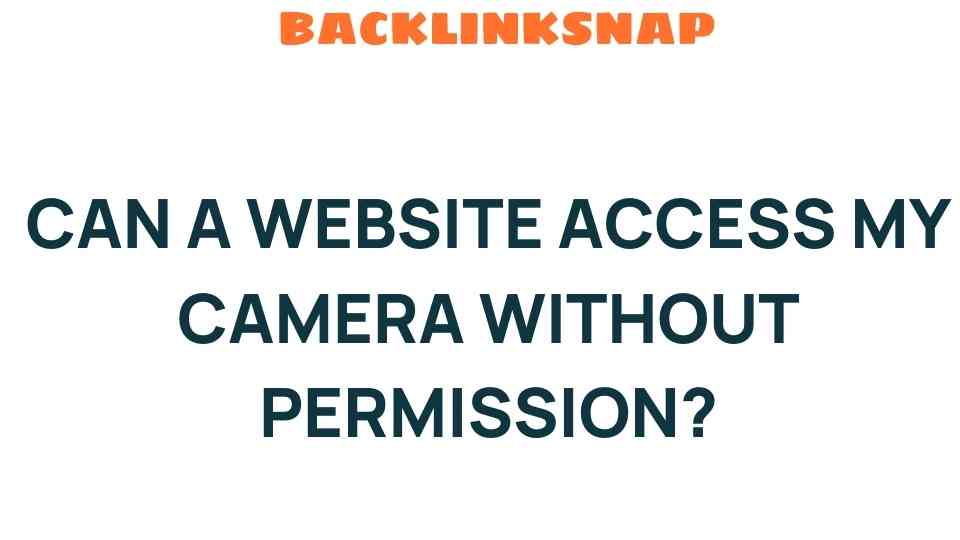Can a Website Access My Camera Without Permission?
In today’s digital age, where online privacy is increasingly becoming a concern, many users wonder about the extent of their control over personal data, particularly regarding website camera access. As technology continues to advance, the risks associated with online surveillance and unauthorized data access have also grown. This article aims to unveil the truth about whether a website can access your camera without your explicit permission, delving into the intricacies of browser permissions, user consent, and cybersecurity.
Understanding Browser Permissions
To grasp the concept of website camera access, it’s essential to understand how browser permissions work. Modern web browsers like Chrome, Firefox, and Safari incorporate security features designed to protect users from unauthorized access to their devices. When a website attempts to use your camera, the browser prompts a notification asking for your consent. This notification is a crucial part of the browser’s security protocol, ensuring that users maintain control over their hardware.
When you visit a website that requests camera access, you’ll typically see a pop-up window that asks something like, “Allow [Website Name] to access your camera?” You can choose to allow or deny this request. If you deny access, the website cannot utilize your camera, safeguarding your privacy.
Can Websites Bypass Permissions?
While it may be theoretically possible for malicious websites to exploit vulnerabilities in software to access your camera without permission, reputable sites adhere to strict privacy protocols. Most reputable browsers are designed to block any attempts at unauthorized access. However, the cybersecurity landscape is ever-evolving, and new threats can emerge.
For instance, if you have an outdated browser or operating system, you may be more vulnerable to security breaches. Cybercriminals can exploit these weaknesses to gain unauthorized access. Therefore, keeping your software updated is critical in protecting your digital safety.
Importance of User Consent
User consent is at the heart of online privacy. According to the General Data Protection Regulation (GDPR) and other privacy laws, websites are required to obtain explicit permission from users before accessing personal data, including camera feeds. This legal framework reinforces the necessity of user consent and aims to protect user rights in the digital space.
- **Explicit Consent**: Users must actively agree to allow access.
- **Informed Consent**: Users should be aware of how their data will be used.
- **Revocable Consent**: Users can withdraw their permission at any time.
If a website fails to secure proper consent for accessing your camera, it may be violating privacy laws, leaving itself susceptible to legal repercussions.
Surveillance and Data Security Concerns
Online surveillance is a growing concern, and the fear of unauthorized camera access amplifies this anxiety. Users often worry about unwanted surveillance from hackers or even the websites themselves. However, the reality is that while unauthorized access can occur, it is relatively rare—provided you are cautious and informed.
To enhance your data security, consider the following practices:
- Use Trusted Websites: Always ensure you are using reputable sites before granting camera access.
- Check Permissions: Regularly review the permissions granted to websites in your browser settings.
- Utilize Security Software: Employ antivirus and anti-malware tools to protect against cyber threats.
- Stay Updated: Regularly update your browser and operating system to patch vulnerabilities.
How to Manage Your Camera Permissions
Managing browser permissions is vital for maintaining your privacy. Here’s how you can control camera access across different browsers:
- Google Chrome: Go to Settings > Privacy and Security > Site Settings > Camera. Here, you can see which sites have access to your camera and revoke permissions as needed.
- Mozilla Firefox: Navigate to Options > Privacy & Security > Permissions. You can manage camera access for individual sites.
- Safari: Click on Safari in the menu bar, then Preferences > Websites > Camera. Adjust settings for different websites.
By being proactive, you can ensure that only trusted websites have access to your camera, thereby enhancing your online privacy.
Conclusion
In summary, while the concept of website camera access raises valid concerns about online privacy, the mechanisms in place generally protect users from unauthorized access. The necessity of user consent, combined with the security measures implemented in modern browsers, provides a robust framework for safeguarding your digital safety. Staying informed about browser permissions and employing best practices can significantly mitigate the risks associated with online surveillance.
Always remember to be vigilant and proactive about your online privacy. The digital landscape is constantly evolving, and so should your strategies for protecting your personal data.
FAQs
1. Can a website access my camera without my permission?
No, reputable websites require explicit permission from users to access their cameras. Browsers have security measures in place to prevent unauthorized access.
2. What should I do if a website is accessing my camera without permission?
If you suspect unauthorized access, immediately revoke permissions in your browser settings and consider running a security scan on your device.
3. How can I check which websites have access to my camera?
You can check and manage camera permissions in your browser settings under the privacy or security section.
4. Are there any signs that my camera is being accessed without my consent?
Signs may include unexpected camera activation, unusual behavior from your device, or unfamiliar applications running. If you notice such signs, investigate immediately.
5. What are the best practices for online privacy regarding camera access?
Use trusted websites, regularly review permissions, utilize security software, and keep your software updated to enhance your online privacy.
Yes, antivirus and anti-malware tools can protect your device from threats, including unauthorized access to your camera.
For more information on digital safety and online privacy, you can visit Privacy.org or explore further on this site about browser permissions and security practices.
This article is in the category Digital Marketing and created by BacklinkSnap Team




